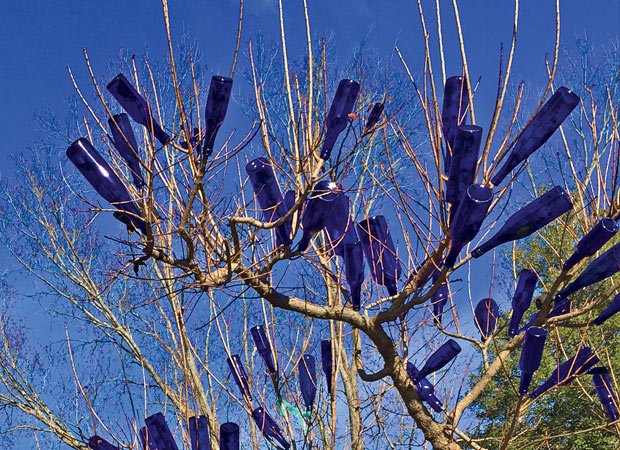
The Supernatural
" host stories... tell us about things that lie hidden within all of us, and which lurk outside all around us."
G
- Susan Hill
As you drive through Chatham, you’ll find that the county is littered with physical relics of its centuries-long past: old farm houses and churches, repurposed factory buildings, historic sites and memorial plaques, all physical landmarks which testify to the county’s history. But for some, the past in Chatham reveals itself in far more intimate, immediate ways.

A bottle tree, outside of the North Carolina Museum of History. Originating in Gullah-Gechee culture, bottle trees are believed to trap unkind spirits, which are attracted by the haint blue color of the bottles.

Below, you will hear residents’ stories recounting their encounters with the supernatural. Some recall benign experiences with spirits, or haints*; others describe more malignant or frightful encounters. Still others describe how they deal with the physical and spiritual ghosts of Chatham's past, particularly its more shameful chapters of enslavement and racism. In any event, these ghost stories are often more than just a collection of trivial folktales; they instead reveal the ways in which the past is made present and how residents' reckon with its haunting legacy.
*A "haint" is a term which originated from Gullah-Geechee culture referring to a spirit or ghost. Likely derived from the word haunt, this term is still used by many in the Southeast, predominantly among African American communities, to refer to supernatural figures and happenings.

Aspen Hall, a former plantation in Chatham. This plantation, was originally owned by the Alstons, a prominent planting family in the county before the Civil War. Today, Alston remains a common last name among both white and Black residents in Chatham, a haunting reminder of enslavement's legacy in Chatham
Listen to the Recordings

Annie McCrimmon
Haints
Description:
McCrimmon describes what a haint is
Transcript:

Annie McCrimmon
Seeing a Haint
Description:
McCrimmon tells the story of childhood haint encounter her sister experienced